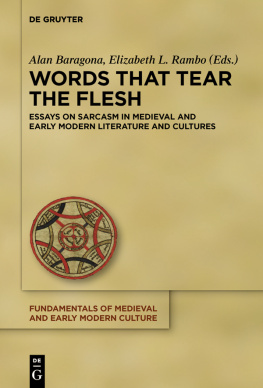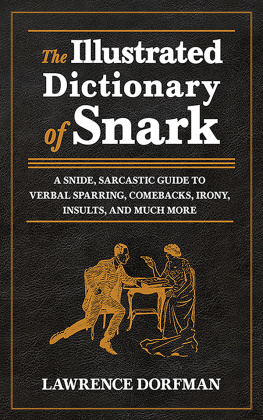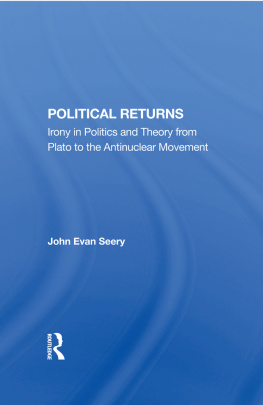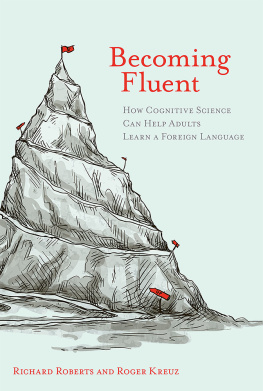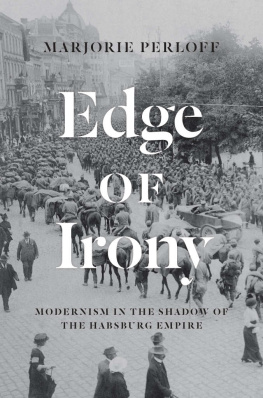Irony and Sarcasm

The MIT Press Essential Knowledge Series
A complete list of the titles in this series appears at the back of this book.
Irony and Sarcasm
Roger Kreuz
The MIT Press | Cambridge, Massachusetts | London, England
2020 The Massachusetts Institute of Technology
All rights reserved. No part of this book may be reproduced in any form by any electronic or mechanical means (including photocopying, recording, or information storage and retrieval) without permission in writing from the publisher.
This book was set in Chaparral Pro by Toppan Best-set Premedia Limited.
Library of Congress Cataloging-in-Publication Data
Names: Kreuz, Roger J., author.
Title: Irony and sarcasm / Roger Kreuz.
Description: Cambridge, MA : The MIT Press, [2019] | Series: The MIT Press
essential knowledge series | Includes bibliographical references and
index.
Identifiers: LCCN 2019019586 | ISBN 9780262538268 (paperback)
Subjects: LCSH: Irony. | Semantics.
Classification: LCC P301.5.I73 K74 2019 | DDC 808.7dc23
LC record available at https://lccn.loc.gov/2019019586
10 9 8 7 6 5 4 3 2 1
Contents
Series Foreword
The MIT Press Essential Knowledge series offers accessible, concise, beautifully produced pocket-size books on topics of current interest. Written by leading thinkers, the books in this series deliver expert overviews of subjects that range from the cultural and the historical to the scientific and the technical.
In todays era of instant information gratification, we have ready access to opinions, rationalizations, and superficial descriptions. Much harder to come by is the foundational knowledge that informs a principled understanding of the world. Essential Knowledge books fill that need. Synthesizing specialized subject matter for nonspecialists and engaging critical topics through fundamentals, each of these compact volumes offers readers a point of access to complex ideas.
Bruce Tidor
Professor of Biological Engineering and Computer Science
Massachusetts Institute of Technology
Acknowledgments
I have benefited greatly from conversations about verbal irony and sarcasm with friends and colleagues over the past three decades. In particular, I would like to express my gratitude to Herb Clark, Sam Glucksberg, Jeff Hancock, Albert Katz, and Penny Pexman. I am especially indebted to my graduate students, past and present, who have conducted research on irony with me. This group includes Gina Caucci, Megan Dress, Alex Johnson, Max Kassler, David Kovaz, Kristen Link Logan, Debbie Long, Monica Riordan, and Richard Roberts. With regard to the present work, Alex, Gina, and Richard were kind enough to read manuscript drafts and to provide suggestions and gentle correction as needed. I probably should have followed their advice even more often than I did.
I also wish to thank Phil Laughlin at the MIT Press for proposing that I write a book on the topic of irony. Phil, your continued support is much appreciated. William Henry deserves kudos for his able editing of my manuscript. Finally, four anonymous reviewers provided me with detailed and helpful feedback (and no, I am not being sarcastic).
Introduction
This book is the biography of a troublesome word. Irony is a term that everyone uses and seems to understand. It is also a concept that is notoriously difficult to define. Much like Winona Ryders character in the 1994 rom-com Reality Bites, whose inability to describe irony costs her a job interview, we know it when we see it, but nonetheless have trouble articulating it. Even worse, it seems as if the same term is used to describe very different things. And following your mothers adviceto look it up in the dictionaryis liable to leave you even more confused than before.
Irony isnt a loner; it spends a lot of time in the company of a shady relative with a checkered reputation. The nature of their relationship, however, is obscure. Sarcasm could be thought of as ironys evil twin. Or perhaps they are better described as siblings, or simply as cousins. Sarcasm is also a bit two-faced, with a penchant for hostility as well as for humor. Psychology Today has characterized sarcasm as one of the worst destroyers of intimacy.Wilde; ironically, it does not appear in his published work. It does, however, capture the yin and yang of sarcasm fairly well.
Irony isnt a loner; it spends a lot of time in the company of a shady relative with a checkered reputation.
Examples of confusion about these terms appear regularly in the news and in popular culture. An American president posts a tweet containing the phrase Isnt it ironic? and is derided for misusing the term. When criticized for thanking Russia for embassy staff reductions, he claims he was being sarcastic. A North Korean dictator bans sarcasm directed at him and his regime because he fears that people are only agreeing with him ironically. A song about irony is mocked because its lyrics contain nonironic examples. And a character in one of the most popular programs on television is a brilliant physicist who nonetheless doesnt seem to understand sarcasm. In short, uncertainty about irony and sarcasm can be found almost everywhere.
As we will see, the term irony has been applied to a number of different phenomena over time, and as a label, it has been stretched to accommodate a number of new senses. But do they all truly belong together under the same conceptual umbrella? And exactly how does irony differ from sarcasm, as well as from related concepts like coincidence, paradox, satire, and parody?
The philosopher Ludwig Wittgenstein proposed that members of a category can be said to share a family resemblance; that is, members of a family look more like each Not everyone in the same family will share the same nose, ears, or chin. They may not all have the same stature or build. But they will have an overlapping set of resemblances that, when taken together, strongly suggest that a given individual is a part of a particular family.
Wittgenstein originally used the notion of family resemblance to make sense of troublesome concepts like game. The number of players, rules, equipment, and scoring may vary widely, but we nonetheless refer to solitaire, poker, chess, and football as members of the game category. We can profitably apply a similar logic to disentangling the concept of irony in its many forms. This approach can also help us to differentiate phenomena that are often seen as being related to irony.
Family resemblance can help us to understand why, for example, it makes sense to refer to particular situations and verbal constructions as ironic. And it can help to explain why certain nonironic phenomena, such as paradox, satire, and parody, are sometimes characterized as members of the irony family. For Wittgenstein, category membership is probabilistic as opposed to absolute. Therefore, if a nonmember possesses several attributes that are characteristic of the concept, cases of mistaken identity may well occur. One goal of this book is to identify the attributes that constitute a family resemblance for the irony concept.
This book also surveys the empirical research that is being conducted on irony and sarcasm. Sarcasm, in particular, is a topic of inquiry for experimental psychologists and linguists, because it illuminates many important aspects of communication and miscommunication. An appreciation of why people choose to express themselves in such ways, and how they go about signaling these intentions, will greatly enrich our understanding of language and behavior.


